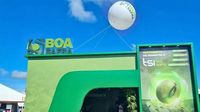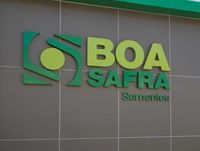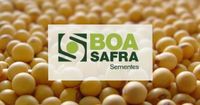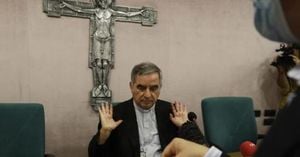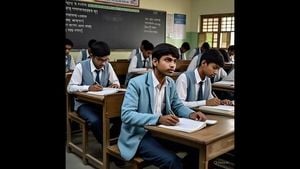A Boa Safra, a prominent Brazilian soybean seed producer, reported a significant decline in its financial performance for the fourth quarter of 2024, with a net profit of R$ 80.263 million. This figure marks a staggering decrease of 62.68% compared to the same period in the previous year, when the company recorded a profit of R$ 215.057 million.
In conjunction with these results, Boa Safra's adjusted EBITDA fell by 7.36% to R$ 131.4 million during the fourth quarter. Despite this downturn, the company did see a notable increase in net revenue, which grew by 13.78% to R$ 956.9 million, largely due to a surge in sales concentrated at the end of the year.
For the entire year of 2024, Boa Safra ended with a net profit of R$ 160.51 million, reflecting a 53.47% drop from the previous year’s earnings. The company attributed this decline to several adverse factors, including reduced sales and profitability driven by climatic challenges, changes in product mix, and increased tax burdens.
Specifically, the adverse weather conditions—characterized by drought at the beginning of the planting season and excessive rainfall during harvest—had a direct impact on production levels. In total, Boa Safra sold 161,000 industrial seed bags in 2024, which represented a 4% decrease from 2023. These bags, also known as big bags, are large-volume seed packages intended for agricultural producers.
Market share for the company slipped from 8.5% to 8.0%, with the most pronounced effects in key agricultural regions such as Mato Grosso, Pará, and Goiás. However, the company did manage to increase its share of treated seeds designed to protect against pests and diseases, even with a lower average ticket price.
Boa Safra also made strides in diversification, with revenue from other crops and services doubling from 5% to 10% in 2024. Sales of bean seeds, for instance, surged by 64% compared to the previous year. The company has been proactive in bolstering its operational structure, opening two distribution centers in Mato Grosso and expanding its factories in Minas Gerais.
Looking towards 2025, Boa Safra plans to increase its production capacity to 280,000 industrial bags, up from 240,000 in 2024. The company has contracted planting areas with partner producers covering 274,000 hectares, which is a 20% increase from the previous year.
At the end of 2024, Boa Safra reported a net cash position of R$ 171.2 million against gross debt of R$ 414 million. A significant highlight was the successful issuance of a R$ 500 million Certificate of Agribusiness Receivables (CRA) in January 2025. This financial instrument is typically used to advance future revenues based on existing contracts with customers.
Marino Colpo, CEO of Boa Safra, commented on the challenges faced in 2024, stating, “The learning gained in a challenging year like 2024 allowed us to enhance our processes and reinforce our commitment to operational efficiency.” He emphasized that the company would continue to adjust its strategy to seek healthier margins and sustainable long-term growth.
Despite the hurdles of the past year, Boa Safra intends to remain active in its acquisition agenda throughout 2025. Colpo noted, “There are good companies in a slightly more difficult situation. These new products, which are more technical, are harder to sell, and we believe that now is a good time to form partnerships.” He indicated that the company plans to announce new strategic movements during the year, supported by a solid financial position and the ability to act strategically in a sector still affected by tight margins, high interest rates, and increased banking selectivity.
With a robust capital structure and low leverage, Boa Safra anticipates a production increase of up to 40% in seed volume this year, aiming to reach 280,000 big bags. In 2024, the company delivered 205,000 big bags, which was below installed capacity due to the aforementioned climatic adversities.
Colpo also highlighted that the company continues to invest despite the challenges of the previous year, stating, “The capacity has been expanded, and we are contracting more area with partners to ensure this progress.” Among its strategic investments, Boa Safra has entered the forage segment by acquiring a stake in SBS Green Seeds, a joint venture focused on regenerative agriculture. “If we didn’t believe this is the future, we wouldn’t have invested. We are talking about more cover crops, more biologicals, fewer chemicals, and a focus on soil health,” he explained.
On the financial front, Boa Safra has bolstered its cash reserves through the issuance of a CRA of R$ 500 million, with CFO Felipe Marques noting that these resources are primarily being used for working capital, such as advancing royalties, purchasing inventory, and financing clients. “Even with high interest rates and a tighter market for agriculture, we had total demand. We issued one of the longest series, spanning five years, which shows investor confidence in our resilience,” he remarked.
By the end of 2024, the company had R$ 585 million in cash and R$ 414 million in gross debt, with most of the liabilities maturing after 2026. The consolidated net debt at year-end was close to zero. Marques stated, “We are in a comfortable position that few companies in agriculture have today. This gives us the freedom to make good allocation decisions and seek growth with security.”
Colpo further noted that Boa Safra continues to enhance its direct commercial operations with clients, aiming for over a thousand visits per month. “We invest heavily in market intelligence to expand our customer base. We are diving deep into this strategy,” he said. The company is also gradually reducing its exposure to large resellers, which has dropped from 64% of revenue in 2021 to 19% in 2024.
Additionally, Colpo underscored the advancements in new seed biotechnologies, which represented approximately 11% of the company's sales in 2023, doubling to 22% in 2024. “The trend is to grow even more this year. Producers are becoming increasingly demanding and seeking technologies that truly deliver results in the field,” he asserted.
Commenting on the use of uncertified seeds, Colpo indicated that “saved or pirated seeds used to account for 40% to 50% of the volume,” but now it is around 10%. “In my view, it has fallen over time. When you go to the Cerrado, which is two-thirds of the market, we’re talking about 6%,” he said. He noted that producers are seeking higher quality, which helps reduce the informal market.
Despite the effects of the sector's downturn in 2024, Boa Safra concluded the year with a delinquency rate of only 1.7% of its receivables portfolio. “Revenue fell by 12%, which is a small retraction compared to what we’ve seen in other agricultural companies. And over 90% of the receivables portfolio has some form of protection. We’re being conservative, but we have the capital to continue investing,” emphasized the CFO.
In Colpo’s assessment, the worst moment for agriculture has passed. “Producers are less indebted. Personally, I’ve seen far fewer judicial recoveries of producers than last year. What we have is a problem in some resellers, large resellers, that were heavily indebted,” he remarked. He noted that production in the fields is, on average, 10% higher than in the previous cycle, indicating a more favorable outlook for 2025.
The results from Boa Safra (BOV:SOJA3) regarding its operations in the fourth quarter of 2024 were disclosed on March 25, 2025.
